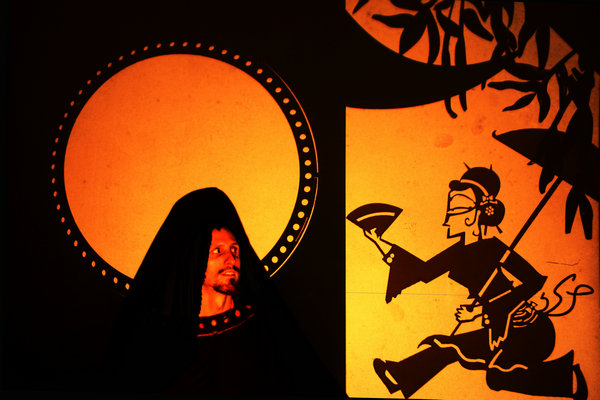 |
|
Evan Hastings introduces Chinese shadow puppetry during a summer program in 2014 in India.[Photo/China Daily] |
Before the show, the artists wore traditional clothes and practiced a ritual - putting together the stage using bamboo sticks.
"Typically shadow puppetry theater is only about the performances, which are purely for entertainment. So the other details are rarely seen," says Li.
"However, many people these days want to be involved and experience the shadows first hand, instead of just watching them. So I thought this (letting the audience experience the preparations) is good for the development of Chinese modern shadow puppetry."
Hastings, 33, who was born in Seattle in the United States, shares Li's vision that shadow puppetry is a great art form when it comes to communicating between different groups of people.
A graduate from the Evergreen State College in Olympia, he moved to the San Francisco Bay Area to pursue a master's degree in drama therapy at the California Institute of Integral Studies in 2005.
Hastings founded Shadow Liberation in 2010 as a month-long intensive project for students at the Srishti Institute of Art, Design and Technology to engage in self-reflection about their gender socialization through drama therapy techniques.
"With the project, we were able to reach a wide range of audiences. We performed for urban poor children, international theater artists, college students and the general public from Bengaluru to Kolkata. After every show, audience members would approach us and share how moved they were by the performance," he says.
According to Li, the original function of shadow puppetry in China was to spread knowledge, promote cultural values and entertain people, but it has lost its appeal because of a lack of creativity. Besides, lots of aspects of shadow puppetry need to be redesigned and re-created to fit modern culture.
She gives examples of three Malaysians, who updated the old art using Star Wars and other pop-culture themes, and Thailand's shadow theater, called Nang Yai, which combines songs, chants and shadow puppets.
She says she was also inspired by a production, The Execution of the Judge of Hell, which had a traditional Chinese ghost story of revenge and retribution told using shadow puppets and Peking Opera.
The show premiered at the Croisement Festival in 2009. It was directed by French drama director Sarah Oppenheim in collaboration with a Beijing-based shadow puppetry theater group, the Hanfeizi Drama Club.
"I think about how to open up the possibilities for shadow puppetry, besides the Mini Shadowplay Festival," says Li.
"I want to invite people from different field to collaborate - ranging from dance to animation."